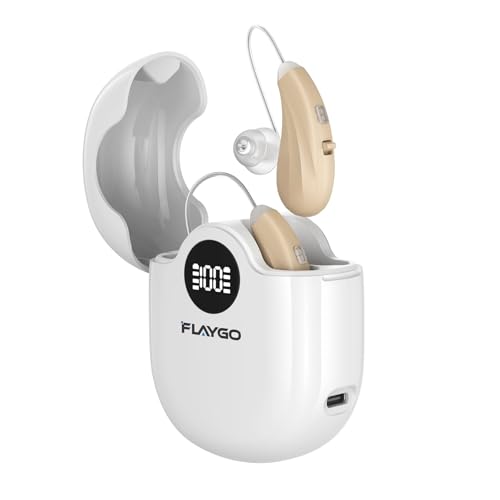Travel costs like gas, parking, and public transit can add up quickly when accessing hearing care. Fortunately, many providers and programs offer reimbursements or assistance to help offset these expenses. You can explore insurance coverage, community programs, or ask your provider about travel vouchers or bundled services that lower overall costs. Using telehealth options and keeping receipts for expenses also makes claiming reimbursements easier. Continue exploring options to make your hearing care more affordable and accessible.
Key Takeaways
- Travel reimbursements and financial assistance programs can offset transportation costs for hearing care visits.
- Telehealth options reduce or eliminate the need for travel, lowering expenses.
- Verify insurance or government programs that cover transportation when hearing services are medically necessary.
- Keep detailed records of travel expenses to facilitate reimbursement claims.
- Providers may offer vouchers or partner with transportation services to help manage travel costs.

When you’re seeking hearing care, travel costs can quickly add up, making it challenging to access the services you need. Whether you’re visiting an audiologist or picking up new hearing aids, transportation expenses—like gas, parking, or public transit—can become a substantial burden. Luckily, there are ways to offset these costs, including travel reimbursements and other financial assistance programs. Many hearing care providers understand this challenge and offer solutions to help you manage expenses more effectively.
One common way to save money is by taking advantage of hearing aid discounts, which some clinics provide for patients who are willing to travel or purchase in bulk. These discounts can considerably reduce the out-of-pocket costs for devices that often come with hefty price tags. When you combine hearing aid discounts with travel reimbursements, the overall financial burden decreases, making hearing care more accessible. Additionally, some providers offer bundled packages that include both the device and consultation fees, helping you avoid unexpected expenses.
Hearing aid discounts combined with travel reimbursements make hearing care more affordable and accessible.
Speaking of consultation fees, audiologist consultation fees can sometimes be a barrier if you’re traveling from a distance. To ease this, check whether your provider offers telehealth options or remote consultations, which eliminate travel altogether. If in-person visits are necessary, ask if they have programs that reimburse travel expenses. Some clinics partner with local transportation services or offer vouchers to help cover taxi or ride-share costs. This way, you’re not solely responsible for the travel expenses, and it becomes easier to prioritize your hearing health.
Beyond direct reimbursements, there are also community programs and insurance plans that provide partial or full coverage for travel to hearing appointments. For example, some health insurance policies or government programs include provisions for transportation when medically necessary. It’s worth exploring these options beforehand, so you’re prepared and aware of what expenses can be covered. Keep receipts and documentation of all travel-related costs, as this can be essential when requesting reimbursements or submitting claims.
Managing eye patch benefits and reimbursements for hearing care requires some planning but can lead to considerable savings. By actively seeking out hearing aid discounts, understanding your insurance coverage, and exploring transportation support options, you make it easier to prioritize your hearing health without breaking the bank. Remember, your hearing is indispensable, and there are resources available to help you access the care you need with less financial stress.

Portable Digital Video Magnifier, Electronic Reading Aid 5.0 Inch with Foldable Handle for The Visually Impaired Macular Degeneration Low Vision, 2X-32X Times Zoom 26 Color Modes
【High Power Magnification】This 5.0 inch portable magnifier reading aids provide 2X-32X zoom magnification, the unit has been an...
As an affiliate, we earn on qualifying purchases.
Frequently Asked Questions
Are Travel Reimbursements Available for Virtual Hearing Care Appointments?
Virtual appointment policies often vary, but generally, travel reimbursements aren’t available for online hearing care visits since you’re not physically traveling. To understand if you qualify, check your provider’s reimbursement process steps, which may include submitting a claim with specific documentation. Typically, you won’t receive travel pay for virtual appointments, but reviewing your insurance or employer’s policies can clarify any exceptions or additional reimbursements.
How Do I Submit Receipts for Reimbursement of Hearing Care Expenses?
You might think submitting receipts is complicated, but it’s straightforward. First, gather your receipts for hearing care expenses. Then, follow your provider’s reimbursement process—usually, you’ll upload or mail your receipt for review. Make sure your receipt includes all necessary details, like date, amount, and service description. Once submitted, wait for approval and reimbursement. Staying organized guarantees a smooth receipt submission process every time.
Do Reimbursements Cover Accommodations During Multi-Day Hearing Care Visits?
Reimbursements typically do cover lodging expenses if your hearing care visits span multiple days, but it depends on your specific policy. You may also be eligible for meal allowances during your stay. Be sure to keep all receipts and submit them promptly. Check your plan’s details to confirm what’s included, as some reimbursements might limit coverage or require pre-authorization for lodging and meals.
Are There Limits on the Amount That Can Be Reimbursed per Visit?
Like a lighthouse guiding your way, travel reimbursement policies set clear boundaries. You should know that limits on reimbursement amounts per visit vary by provider and plan. To navigate, review your expense claim process carefully, ensuring you stay within the set limits. This way, you can maximize your benefits without surprises, knowing exactly what’s covered and how much you can claim for each hearing care visit.
Can Family Members Also Receive Travel Pay for Accompanying Patients?
You may wonder about family member eligibility for travel pay when accompanying patients. Typically, reimbursement processes vary, but many programs allow family members to receive travel pay if they’re officially documented as escorts or caregivers. Check your specific policy’s guidelines, as some require proof of relationship or caregiving role. confirm you follow the reimbursement process carefully to qualify, and keep all receipts and documentation for a smooth claim.

Joanbro Personal Sound Amplifier for Seniors, Voice Enhancement Devices, Pocket Sound Amplifiers for Elderly People, Adults, 50dB Gain, with Headphones & Earbud, 3 Types Mics, 3 Tone, Volume Control
SUPERIOR PERSONAL SOUND AMPLIFIER: Applying noise cancelling, automatic gain control and advanced amplifying circuit, this sound amplifier device...
As an affiliate, we earn on qualifying purchases.
Conclusion
Think of your travel and reimbursements as keys opening the door to better hearing. Just like a trusted compass guides you through unfamiliar terrain, knowing your options guarantees you’re supported every step of the way. Don’t let distance block your path to clearer hearing; instead, see it as a bridge to new opportunities. Embrace these benefits as your own personal map, leading you toward health, confidence, and a brighter, more connected future.

Audien Hearing ATOM PRO 2 Wireless Rechargeable OTC Hearing Aids, Premium Comfort Design and Nearly Invisible
Hear What Matters, Forget the Rest: Tired of asking, “What?” in conversations? The Atom Pro 2 is here...
As an affiliate, we earn on qualifying purchases.

Flaygo Hearing Amplifiers, Otc Hearing Aids For People With Hearing Loss, Sound Quality Restoration, Intelligent Noise Reduction, Standby 80h, One-Button Operation, Comfortable Wearing, White
Digital Chip, HIFI Sound Quality:Hearing amplifiers have a built-in 16-channel digital chip with intelligent noise reduction technology that...
As an affiliate, we earn on qualifying purchases.










